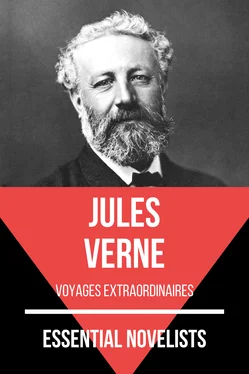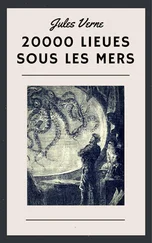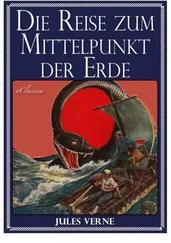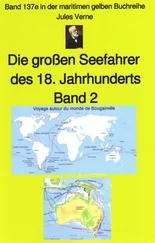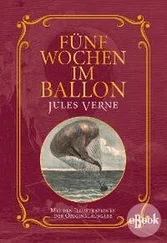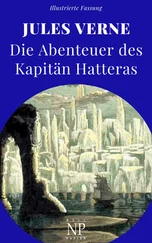They sought in vain. The Esperance and the Recherche passed before Vanikoro without stopping there, and, in fact, this voyage was most disastrous, as it cost D'Entrecasteaux his life, and those of two of his lieutenants, besides several of his crew.
Captain Dillon, a shrewd old Pacific sailor, was the first to find unmistakable traces of the wrecks. On the 15th of May, 1824, his vessel, the St. Patrick, passed close to Tikopia, one of the New Hebrides. There a Lascar came alongside in a canoe, sold him the handle of a sword in silver that bore the print of characters engraved on the hilt. The Lascar pretended that six years before, during a stay at Vanikoro, he had seen two Europeans that belonged to some vessels that had run aground on the reefs some years ago.
Dillon guessed that he meant La Perouse, whose disappearance had troubled the whole world. He tried to get on to Vanikoro, where, according to the Lascar, he would find numerous debris of the wreck, but winds and tides prevented him.
Dillon returned to Calcutta. There he interested the Asiatic Society and the Indian Company in his discovery. A vessel, to which was given the name of the Recherche, was put at his disposal, and he set out, 23rd January, 1827, accompanied by a French agent.
The Recherche, after touching at several points in the Pacific, cast anchor before Vanikoro, 7th July, 1827, in that same harbour of Vanou where the Nautilus was at this time.
There it collected numerous relics of the wreck—iron utensils, anchors, pulley-strops, swivel-guns, an 18 lb. shot, fragments of astronomical instruments, a piece of crown work, and a bronze clock, bearing this inscription—"Bazin m'a fait," the mark of the foundry of the arsenal at Brest about 1785. There could be no further doubt.
Dillon, having made all inquiries, stayed in the unlucky place till October. Then he quitted Vanikoro, and directed his course towards New Zealand; put into Calcutta, 7th April, 1828, and returned to France, where he was warmly welcomed by Charles X.
But at the same time, without knowing Dillon's movements, Dumont d'Urville had already set out to find the scene of the wreck. And they had learned from a whaler that some medals and a cross of St. Louis had been found in the hands of some savages of Louisiade and New Caledonia. Dumont d'Urville, commander of the Astrolabe, had then sailed, and two months after Dillon had left Vanikoro he put into Hobart Town. There he learned the results of Dillon's inquiries, and found that a certain James Hobbs, second lieutenant of the Union of Calcutta, after landing on an island situated 8° 18' S. lat., and 156° 30' E. long., had seen some iron bars and red stuffs used by the natives of these parts. Dumont d'Urville, much perplexed, and not knowing how to credit the reports of low-class journals, decided to follow Dillon's track.
On the 10th of February, 1828, the Astrolabe appeared off Tikopia, and took as guide and interpreter a deserter found on the island; made his way to Vanikoro, sighted it on the 12th inst., lay among the reefs until the 14th, and not until the 20th did he cast anchor within the barrier in the harbour of Vanou.
On the 23rd, several officers went round the island and brought back some unimportant trifles. The natives, adopting a system of denials and evasions, refused to take them to the unlucky place. This ambiguous conduct led them to believe that the natives had ill-treated the castaways, and indeed they seemed to fear that Dumont d'Urville had come to avenge La Perouse and his unfortunate crew.
However, on the 26th, appeased by some presents, and understanding that they had no reprisals to fear, they led M. Jacquireot to the scene of the wreck.
There, in three or four fathoms of water, between the reefs of Pacou and Vanou, lay anchors, cannons, pigs of lead and iron, embedded in the limy concretions. The large boat and the whaler belonging to the Astrolabe were sent to this place, and, not without some difficulty, their crews hauled up an anchor weighing 1,800 lbs., a brass gun, some pigs of iron, and two copper swivel-guns.
Dumont d'Urville, questioning the natives, learned too that La Perouse, after losing both his vessels on the reefs of this island, had constructed a smaller boat, only to be lost a second time. Where, no one knew.
But the French Government, fearing that Dumont d'Urville was not acquainted with Dillon's movements, had sent the sloop Bayonnaise, commanded by Legoarant de Tromelin, to Vanikoro, which had been stationed on the west coast of America. The Bayonnaise cast her anchor before Vanikoro some months after the departure of the Astrolabe, but found no new document; but stated that the savages had respected the monument to La Perouse. That is the substance of what I told Captain Nemo.
"So," he said, "no one knows now where the third vessel perished that was constructed by the castaways on the island of Vanikoro?"
"No one knows."
Captain Nemo said nothing, but signed to me to follow him into the large saloon. The Nautilus sank several yards below the waves, and the panels were opened.
I hastened to the aperture, and under the crustations of coral, covered with fungi, syphonules, alcyons, madrepores, through myriads of charming fish—girelles, glyphisidri, pompherides, diacopes, and holocentres—I recognised certain debris that the drags had not been able to tear up—iron stirrups, anchors, cannons, bullets, capstan fittings, the stem of a ship, all objects clearly proving the wreck of some vessel, and now carpeted with living flowers. While I was looking on this desolate scene, Captain Nemo said, in a sad voice:
"Commander La Perouse set out 7th December, 1785, with his vessels La Boussole and the Astrolabe. He first cast anchor at Botany Bay, visited the Friendly Isles, New Caledonia, then directed his course towards Santa Cruz, and put into Namouka, one of the Hapai group. Then his vessels struck on the unknown reefs of Vanikoro. The Boussole, which went first, ran aground on the southerly coast. The Astrolabe went to its help, and ran aground too. The first vessel was destroyed almost immediately. The second, stranded under the wind, resisted some days. The natives made the castaways welcome. They installed themselves in the island, and constructed a smaller boat with the debris of the two large ones. Some sailors stayed willingly at Vanikoro; the others, weak and ill, set out with La Perouse. They directed their course towards the Solomon Islands, and there perished, with everything, on the westerly coast of the chief island of the group, between Capes Deception and Satisfaction."
"How do you know that?"
"By this, that I found on the spot where was the last wreck."
Captain Nemo showed me a tin-plate box, stamped with the French arms, and corroded by the salt water. He opened it, and I saw a bundle of papers, yellow but still readable.
They were the instructions of the naval minister to Commander La Perouse, annotated in the margin in Louis XVI's handwriting.
"Ah! it is a fine death for a sailor!" said Captain Nemo, at last. "A coral tomb makes a quiet grave; and I trust that I and my comrades will find no other."
Chapter XIX
Torres Straits
––––––––

DURING THE NIGHT OF the 27th or 28th of December, the Nautilus left the shores of Vanikoro with great speed. Her course was south-westerly, and in three days she had gone over the 750 leagues that separated it from La Perouse's group and the south-east point of Papua.
Early on the 1st of January, 1863, Conseil joined me on the platform.
"Master, will you permit me to wish you a happy New Year?"
Читать дальше
